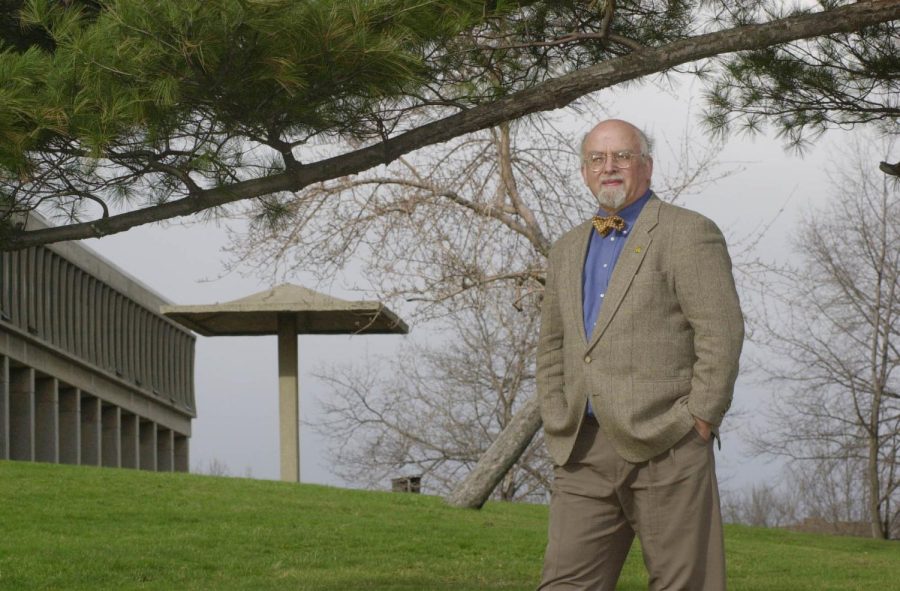Former professor, faculty marshal reflects on May 4 tragedy before 51st commemoration
May 3, 2021
Jerry M. Lewis believes the events of May 4, 1970, are a transformative part of Kent State’s history that should be remembered.
Lewis served as a faculty marshal and was an eyewitness to the shootings on May 4, 1970, when members of the Ohio National Guard fired into a crowd of anti-war protest demonstrators, killing four and wounding nine students. He became an emeritus professor in 1996, after teaching at Kent State for 51 years.
The 51st May 4 Commemoration and Candlelight Vigil will be held virtually beginning at noon on Tuesday.
The events of May 4 had a huge impact on Lewis and his professional life.
“I can’t think of any other event that impacted my life like being a professor at Kent State and the May 4 experience,” he said. “My whole career changed at 12:24. I knew immediately after the shootings that I would have to write about it, and I did.”
He spent many years researching, memorializing and lecturing about the tragedy, and has since published numerous articles about May 4 and the aftermath. Lewis was also one of four coauthors of the application that added the May 4 site to the National Register of Historic Places in February 2010.
Lewis had a long road to teaching that began in Elmhurst, Illinois, where he was raised. He describes himself as a Midwesterner through and through.
He earned a bachelor’s degree from Cornell College, a small Methodist school in Mount Vernon, Iowa, where he studied religion and English before deciding to major in sociology. His passion for sociology came from a course he took in high school, he said.
During his senior year at Cornell College, Lewis was drafted into the U.S. Army, where he served in the six-month program.
He went on to earn his master’s degree in communications from Boston University, before returning to his home state and earning his doctoral degree from the University of Illinois.
Lewis joined the sociology department at Kent State in 1966. He taught courses on collective behavior, sociology of religion, sociological theory and introductory sociology. In 1983, his teaching was recognized by the Alumni Association Distinguished Teaching Award.
“Not only is he a fantastic teacher, but he’s a very nice person and a very good friend,” said Jerry D. Feezel, professor emeritus of communication studies, former dean of the College of Arts and Sciences and longtime colleague and friend of Lewis.
Lewis has a strong commitment to activism, helping people, and making the world better through his academic research and teaching, Feezel said. He said Lewis is committed to establishing historical accuracy about the events of May 4.
“I admire his stepping in to protect and help the students after the shootings on campus,” Feezel said. “He saw that there were many events of May 4 that needed to be pursued and diligently followed.”
Feezel said he admires Lewis for applying his sociological research and interest in crowd behavior to the complicated and tragic events of May 4.
Last year, more than seven years after his retirement, Lewis was invited by Kent State administration to ring the Victory Bell at the 50th commemoration of the tragedy. This was an incredible experience because ringing the bell is such an important ritual of May 4, he said.
“In many ways, the commemoration serves to protect democracy and free speech,” Lewis said. “When we gather on the commons every May 4, and we say what happened in 1970 was wrong and shouldn’t have happened, and we honor the suffering of the students and their families, we are fighting for free speech.”
Kent State’s efforts to honor and remember the tragedy is a great service, Lewis and Feezel agree.
“It is essential that Kent State continues to remember May 4,” Lewis said. “because it honors the four [killed] and the nine [injured], and comforts the parents and relatives, but more importantly, it provides a medium for protest and study on social problems.”
There are many lessons to be learned from May 4, Lewis said. He wants students to know that there are physical, emotional and intellectual risks to student activism.
“People get hurt. People die. A student shouldn’t become an activist for marijuana rights, women’s rights, voting rights, unless they are willing to take risks,” he said. “Students who enter into activism without being aware of those risks are in danger, and it’s our responsibility as teachers to prepare them for these risks.”
Zoë Blank covers alumni. Contact her at [email protected].












